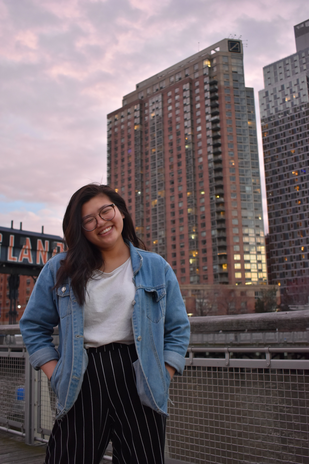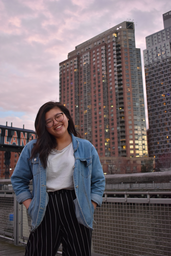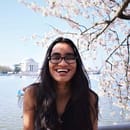Chloe K. Li was sitting in the dark underneath her loft bed in Roper hall as a freshman, working on a story for AWOL about the Methodist Church reinstating their ban on LGBTQ clergy, when she realized that she wanted to be a journalist. Now a junior, Chloe has made American her own and is a student media board co-chair, editor in chief of AWOL and an Emma Bowen fellow, interning with WNYC and The Gothamist in New York.
As a student media board co-chair, Chloe helps AU’s media organizations navigate “what it means when you are a newsroom or tv channel or radio station or literary magazine that has to function solely based on a private university when you are trying to be independent.” Within her own organization, as editor-in-chief of AWOL, she is “currently looking at this newsroom that has been functioning so poorly and yet managing so well to create stories and trying to make it easier for everyone to work in.”
For Chloe, the purpose of journalism is “finding an ability to transition between this idea of what we have now and what could be because we give this information and source material for people to create theory in the academic sense and also to document movements.” She explains that “many say that the revolution will not be televised but without the televisation, no one else will know about it.”
In terms of her own role in the broad field of journalism, Chloe is resolute in her intention to be an investigative journalist working within local communities, covering issues that impact people on a day-to-day basis, something that she believes national journalism is unable to do on the same level as local journalism.“There’s this trend lately of big news publications that actively have to negotiate with the government in order to do their jobs when there are other ways to do things. I want to be a journalist that doesn’t have to negotiate with the government and actually has that same relationship that most journalists have with the NYPD communications office with actual people, whether that be organizers or citizens,” says Chloe.
In addition to a journalism major, Chloe has a literature minor in transcultural studies. “In an ideal world where I could just sit and read and analyze the world, I would. The big thing with literature is the concept of tying theory into creative work. This ties into the reason I’m a journalist – the effect of storytelling and how it can make theory accessible.”
Though she has accomplished so much already, the article she is most proud of is one that she wrote about sugar dating because in the process of putting together this article, the young women she was writing about opened up to her and felt comfortable trusting her with their vulnerability. Speaking to her accomplishments as a journalist thus far, Chloe says, “Communities that I feel are vulnerable and that I can identify with have learned to trust me despite my title of being the press. Being a journalist means understanding and accepting that people don’t trust us because so many older journalists have left a reputation and legacy that we will have to fix. So I think the thing I’m most proud of is being able to get these people to trust me and keep their trust and hold that sacred in the process of my reporting.”
As a journalist, she admires her peers in her newsrooms, both at her internship and at AWOL. Chloe says that the people she is inspired by are “people who I work with, not people who work above me, because I don’t learn from them in my opinion as much as I do from the people I work next to all the time.” But there isn’t just one thing that inspires or drives her. “There are big things such as my ancestors, not just in terms of direct blood but in the community that I am a part of that have worked to bring change and the concept of moving things a little bit further. But there are also smaller things. I’m part of the AASU advocacy community and every week we do roses, buds and thorns and just seeing people taking care of themselves and doing self-care and community-care means a lot to me. What inspires me is that people have and can and will survive without the support that comes from the institutions that say they’re supporting them.”
Being someone with so much on her plate, Chloe is more than familiar with the struggle of balancing everything that she is involved in. “I balance it by realizing that there are 24 hours in a day and that is enough time. I might be exhausted by the end of the day but I will be exhausted no matter what anyways, even if i don’t do anything all day, so might as well do stuff that I love,” she says. However, Chloe acknowledges that there is more to it.
“A lot of it is asking for help, which is very difficult for a lot of people. Asking for help can be anything from “hey can you grab that order so i can run to the restroom?” at work to “hey, I need therapy, can you help me find therapy.” It can also be “I need time to cry, can you leave the room for five minutes.” She explains, “I don’t like the idea of individuals because no one is an individual in my opinion, everyone is a product of their community and what their community can do and will do for them and so balancing it is not the issue but rather asking for help in a community that makes you feel like an individual.”
Despite her intended career path, Chloe says “being a journalist isn’t the ideal trace that I want to leave when I die.” Instead, she would like to somehow be a part of the movement towards repatriating land, an action that she acknowledges has nothing to do with her job as a journalist but is of great importance to her.
When asked to talk about something that most people don’t know about her, she mentions that the big thing that no one asks her about is her family’s immigration history. “I’m from Sunset Park in Brooklyn, NY, and the neighborhood matches my family because there are a lot of different people from different countries due to the complex history of colonialism and imperialism, so the big thing would be where my family comes from,” she says.
Elaborating on this history, Chloe tells the story of how her family constantly moved from one country to another for a long period of time. “In the late 1700’s or early 1800’s, a bunch of chinese men went to Cuba and Peru to work. They called them coolies and they were a replacement for what was starting to be the end of the atlantic slave trade. It was using cheap or free labor to replace enslaved labor, which is how my family ended up there. What follows is a long history of my family constantly moving from Peru back to China, back to Portugese Territory in China. My great grandmother is from Cuba and my great grandfather is from Peru and within that they had kids and each of them decided to marry someone from a different country. At this point, my family, which was already complicated enough, moved to America.” Talking of this complex history, she says, “The idea that globalization has to have a white face attached to it is a myth, globalization is enacted and happens largely to and from people of color.”
As a person of color, one of the most important lessons Chloe has gained from her experiences thus far is that there is that there is place for people of color in positions of power even if that place is not currently occupied by a person of color, and that they have every right to claim space for themselves and feel comfortable in it.
Speaking to Her Campus American’s Womxn of the Year event, Chloe says that she wants “to acknowledge how wonderful it is that HCAU has highlighted so many women of color for this award who are doing wonderful work and who are surrounded by incredible peers.” She also believes that such an event acts as “a reminder for all organizations who choose to highlight women of color to ensure their staff members that are women of color feel not just welcome within their organizations but also feel like they have the ability to make executive decisions that can change or guide the organization.”
On behalf of Her Campus at American University and the entire American University community, we would like to thank Chloe K. Li for everything she has done to advance equality and inclusivity on our campus.
Photo Credit: Her Campus Media



